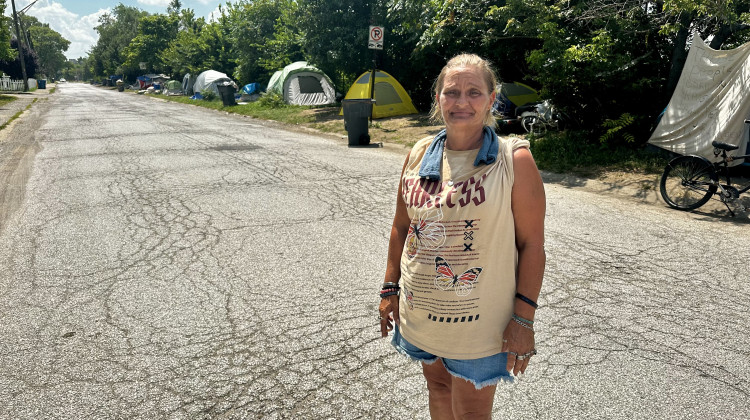
Cosmo Xavier is a peer support specialist with the Damien Center’s new youth housing program.
Jill Sheridan/WFYILGBTQ youth are disproportionately at risk of homelesness. It’s often because they are rejected by their family as they are coming into their sexual identity. A new program from one Indianapolis organization has received federal funding to address this issue.
Coming out was not an easy experience for Cosmo Xavier. Mental health problems forced her out of her parents home and she ended up moving to Greenfield where she had a few friends she thought may be able to help and give her a place to stay.
“Then things started falling apart,” Xavier said, “there were people in my life that did not want me in front of their children. One of the people that I consider to be my best friends was like ‘if my kid grows up to wear a skirt, I'm killing you.’”
Xavier had a job at a gas station, where she also faced discrimination. She didn’t make enough to get her own place so she did a lot of couch surfing and spent some nights unsheltered.
“But like not being able to afford your own place, like knowing that you're like sleeping on the floor in somebody else's house and you're at their mercy if they decide to get rid of you, you know,” Xavier said.
Outside the Damien Center on a bright spring day, now 28 year-old Xavier identifies as transgender and queer. Dressed in a black skirt over leggings and a bright blue Damien shirt she talked about her new gig at the established HIV service provider on Indianapolis’ near eastside.
“Learning how to do this job in the middle of a pandemic. I've never had a job like this before. So having to learn how to do this on top of learning how to navigate a global pandemic,” Xavier said.
The job is hard, but she wouldn’t trade it. As a peer support specialist with the Damien Center’s new youth housing program, Xavier works directly with young people at risk of homelessness and having lived experience helps.
“You're looking for somebody who looks like you. You're looking for somebody who understands the thing that you've done, understand this thing that you've been through and you're looking for,” Xavier said.
Indianapolis recently awarded the program HUD funding through the Youth Homelessness Demonstration Program. Team lead Jamie Reynolds said they can do things a little differently and give the youth they work with more power.
“Everything that we do, it's youth led,” Reynolds said. “Young people make decisions for themselves. And the idea is that they're the experts on young people.”
Reynolds and three team members, including Xavier, meet with, contact and help manage services for LGBTQ youth at risk of homelessness. Young people who don’t have the right life skills yet.
“Because we aren’t taught how to handle any of this,” Xavier said, “at all.”
The program at Damien serves LGBTQ youth regardless of their HIV status The Damien was established 34 years ago to provide HIV and AIDS related services in Indianapolis. Through the years, it has been able to increase the types of services it provides.
The old building on the eastside features a health clinic and a food pantry. Housing has also become a focus in recent years.
Reynolds said young people experiencing housing instability face many challenges.
“Transportation is always an issue. So bus passes, helping people figure out how to get cars, if that's a goal that they want to work on. And a lot of young people want to address their mental health issues,” Reynolds. “So being able to talk.”
And all of those issues, and especially housing, can have long term impacts on their lives.
“If you don't have a place to live, it's nearly impossible to finish up your education to get employment. You know, even get an ID because you have to have an address to provide to get these things. If you don't have an ID, you can't get a job,” Reynolds said.
The Coalition for Homeless Intervention and Prevention or CHIP helped facilitate funding for Damien’s new program as well as a number of others addressing youth homelessnes in Indianapolis. Executive Director Chelsea Haring-Cozzi said she wants young people to know that there is help, whether it’s at Damien or somewhere else.
“For young people to know that there are safe places to come in to connect and people doing this work who truly understand,” Haring Cozzi said.
The demonstration program, that is also being implemented in a number of U.S. cities, aims to develop and implement a coordinated community approach. Haring-Cozzi said the core of it’s focus is equity in access.
“For young people, again in particular making sure that equity is at the center of every project,” Haring-Cozzi said, “every intervention that's happening not just around LGBTQ youth, but also black and brown youth who are very over represented in homelessness as well.”
Cosmo Xavier says appreciating the diversity of young people experiencing homelessness can go a long way.
“Be aware of the types of people that you're around, be aware of their story. Because these are not isolated incidents. These are things that happen to real people in our hometown all the time,” Xavier said.
The city has a goal to end youth homelessness by 2023.
 DONATE
DONATE






 Support WFYI. We can't do it without you.
Support WFYI. We can't do it without you.